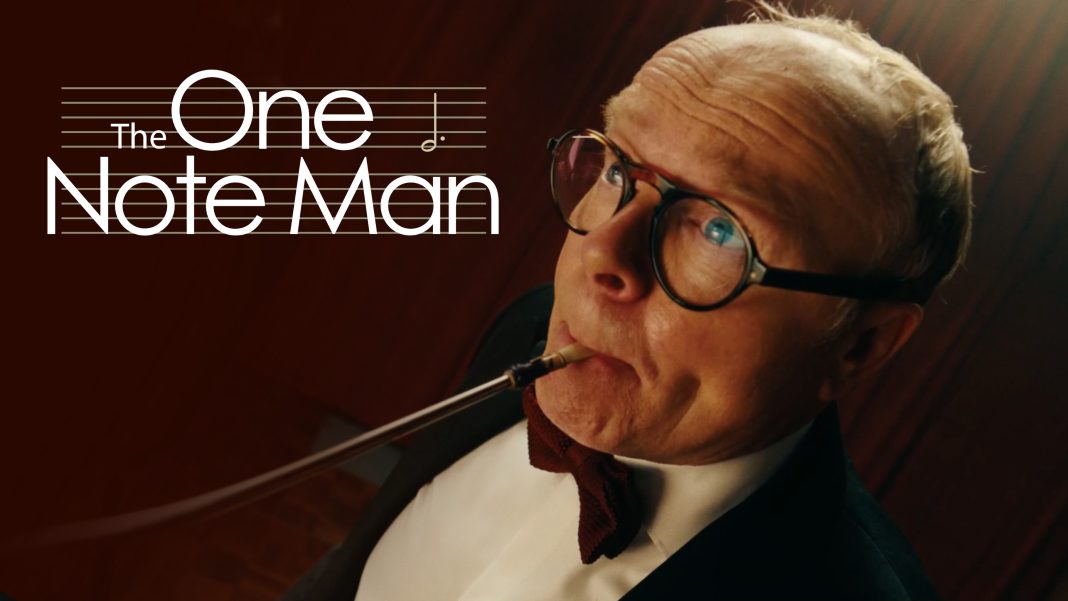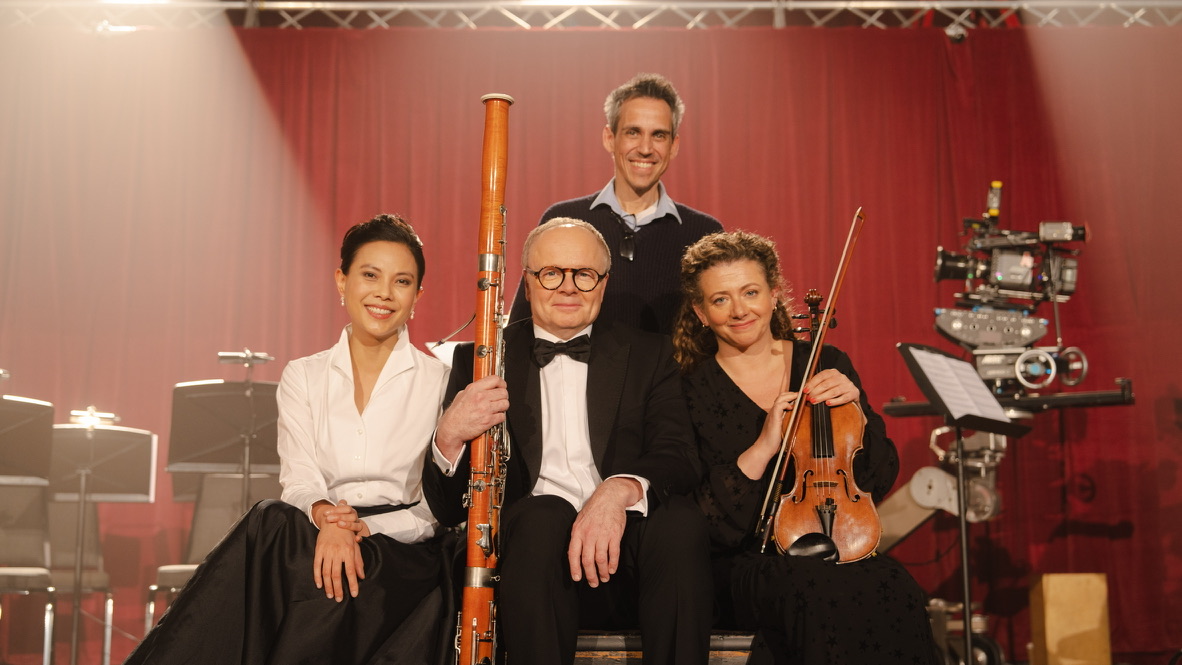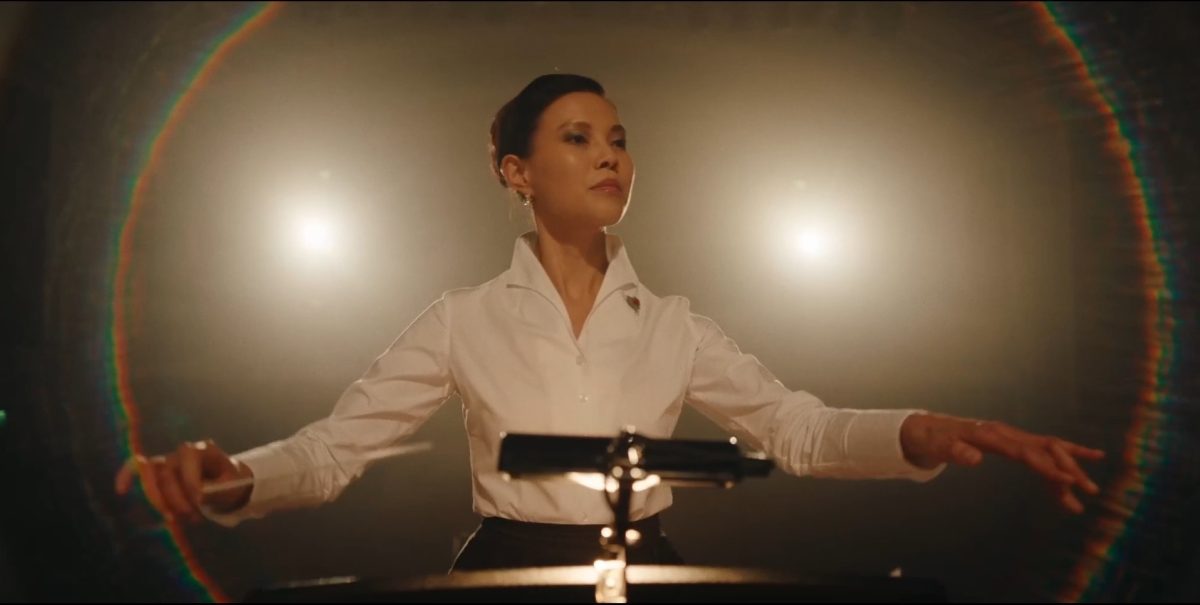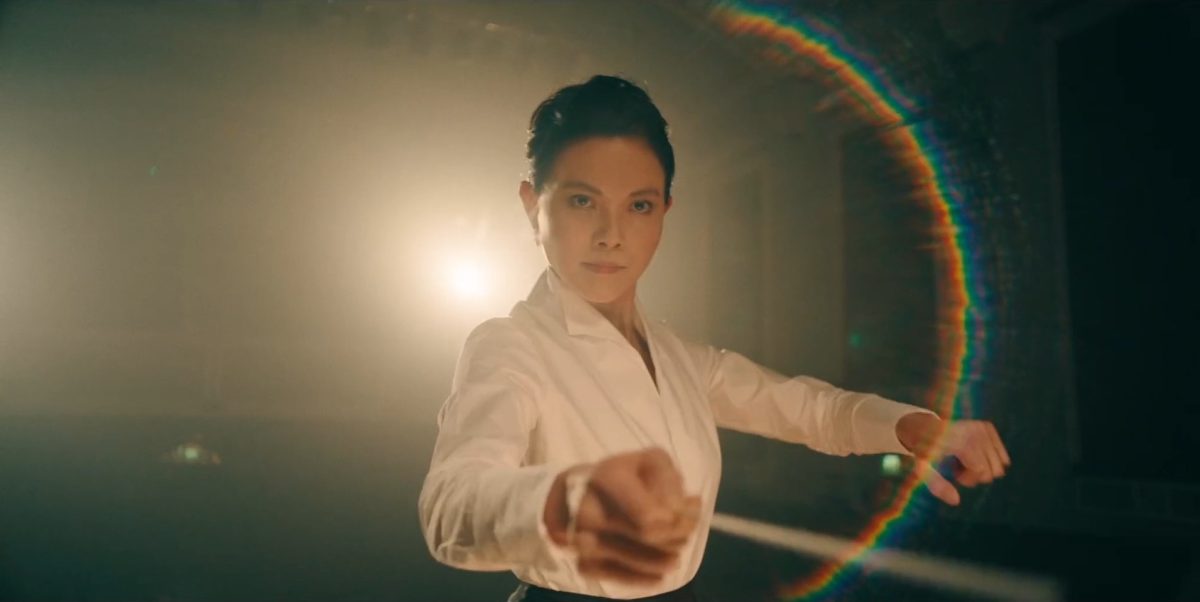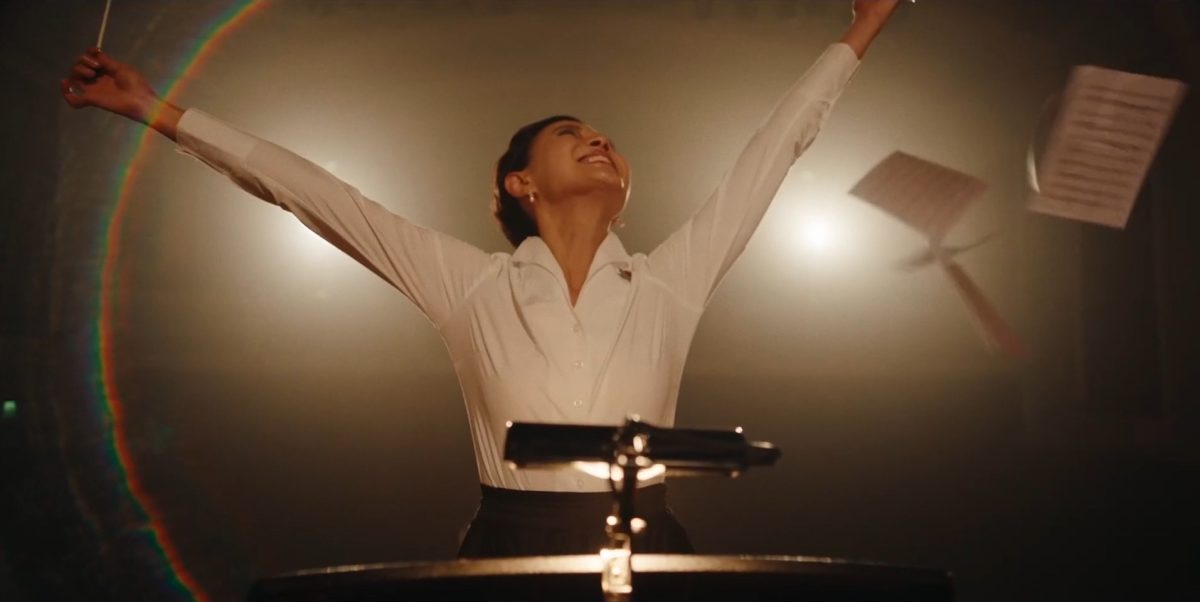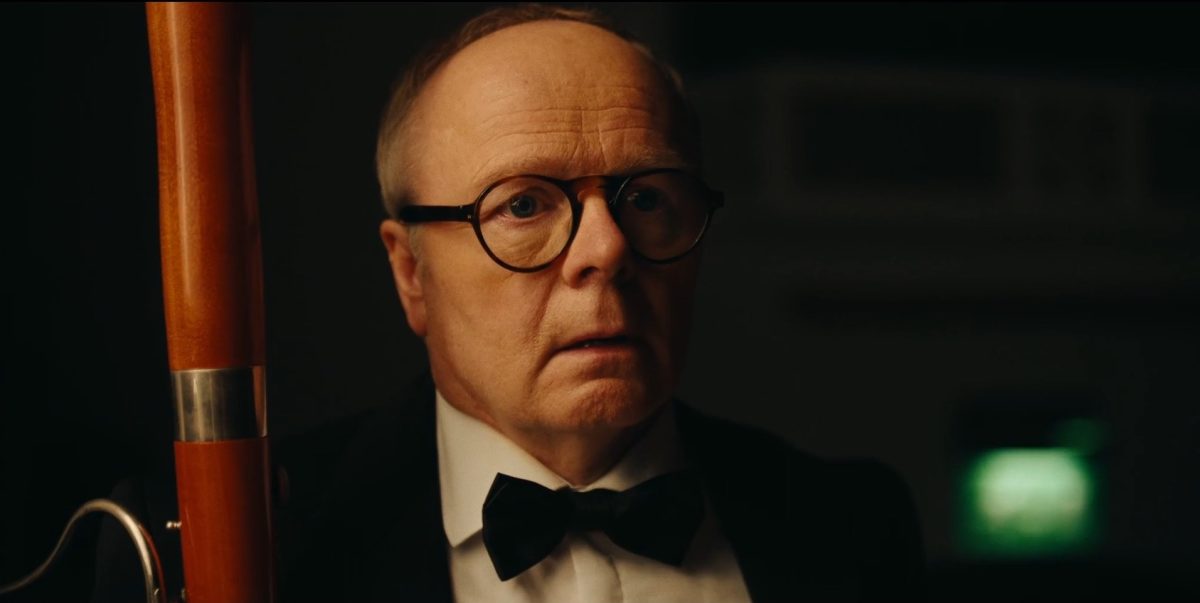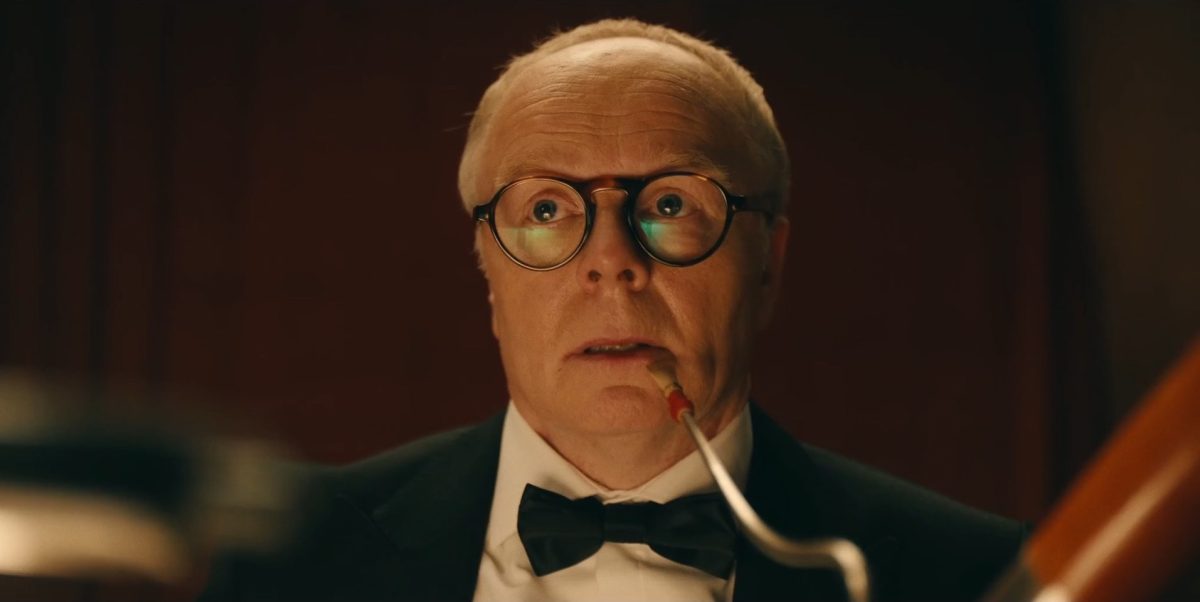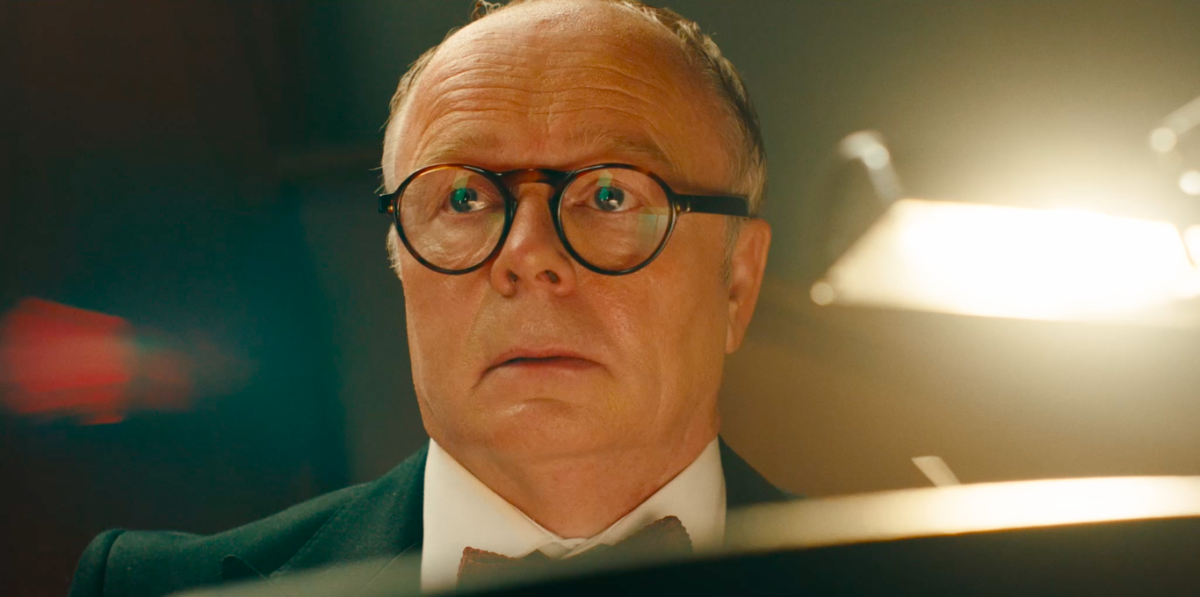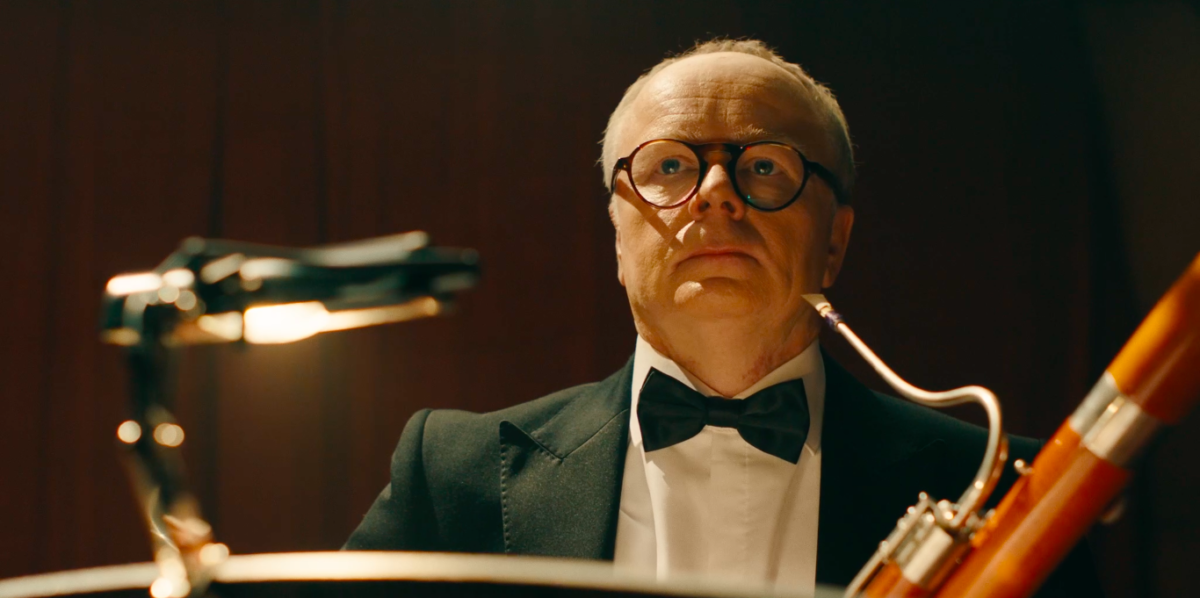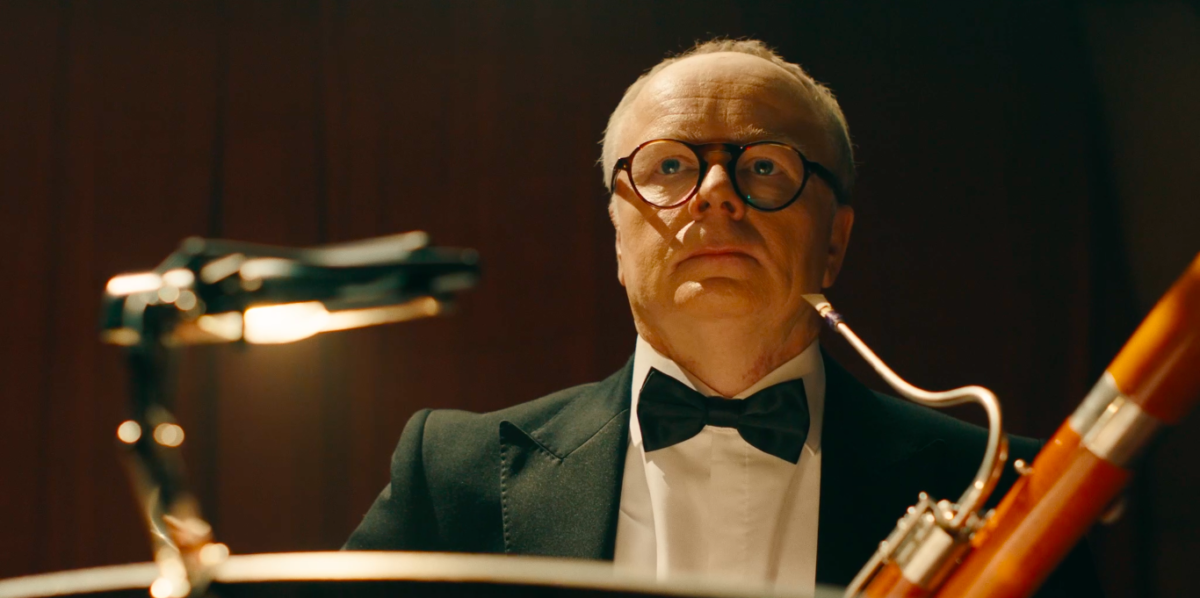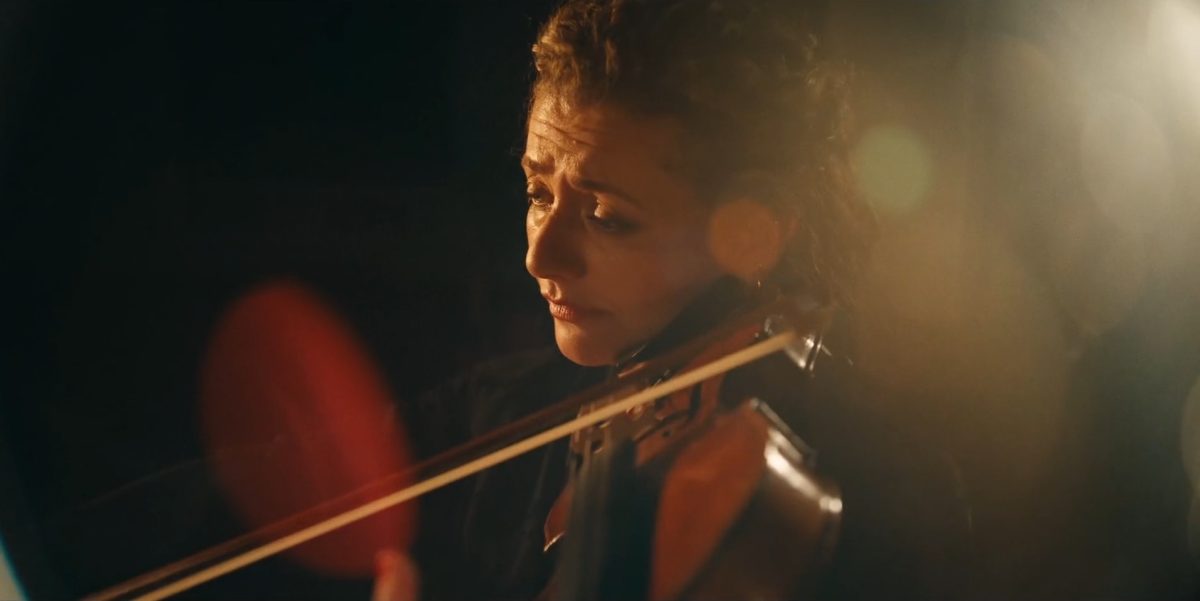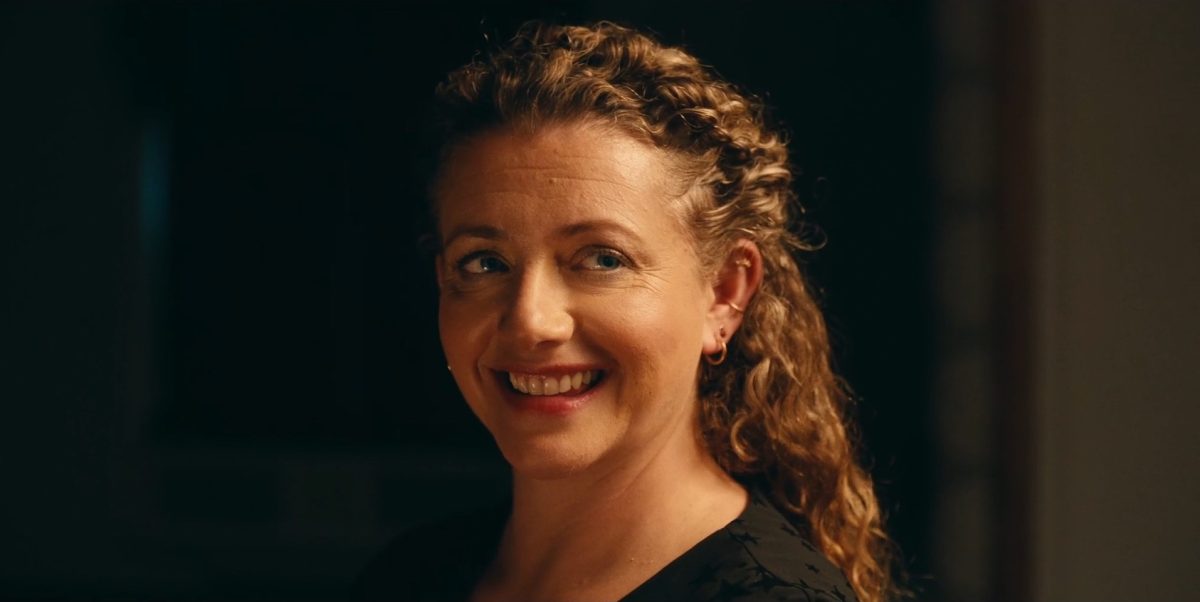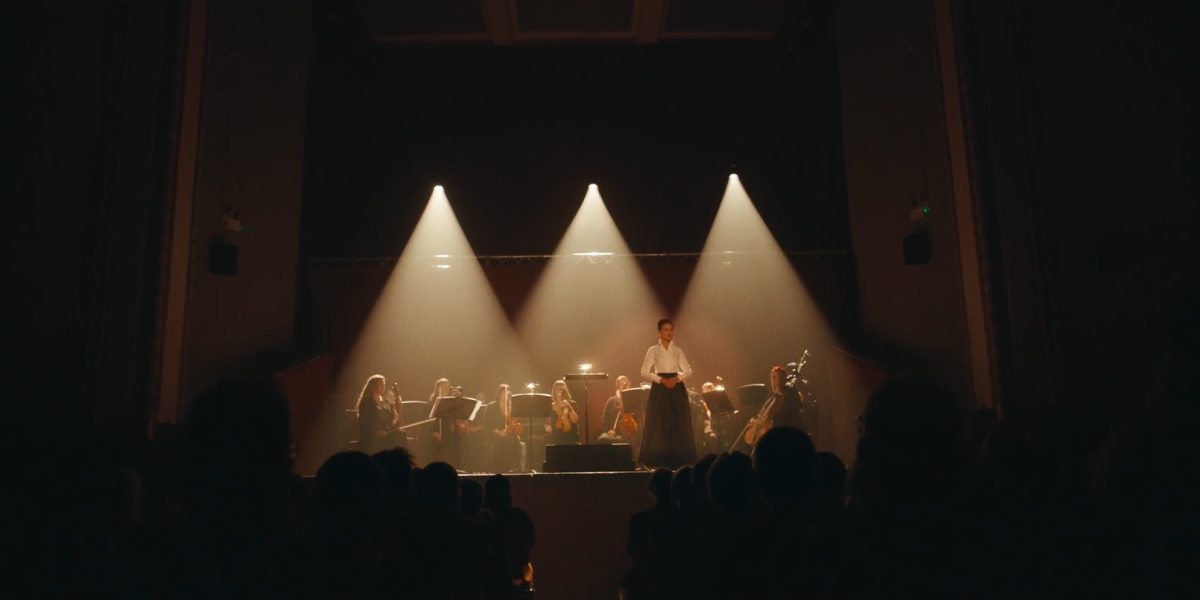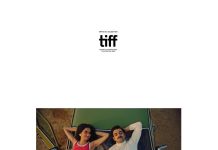I came across an interview with Hitchcock where he spoke about the opening of THE MAN WHO KNEW TOO MUCH.
The film opens with the caption “A single crash of cymbals and how it rocked the lives of an American family”. Then it fades in on a wide shot of an orchestra playing and the camera isolates the cymbals player patiently waiting for his turn. As he crashes his cymbals, the picture fades out and the film starts.
Hitchcock mentions he got the inspiration for this opening from a 1921 illustration called ‘The One Note Man’ by H. M. Bateman. Hitchcock actually describes the illustration which is essentially the story of a musician who goes through his daily, mundane routine and whose job is to play a single note at an orchestra. After he plays his note, the musician gets the nod from the conductor, steps off the stage and goes home.
I really loved the idea so I made contact with H.M. Bateman’s granddaughter Lucy Willis, who is now in her 70s, and asked her permission to develop it into a short film and ultimately turned it into a love story about perseverance and stepping out of your comfort zone.
The idea just spoke to to me and I wrote the whole thing in a day during lockdown. Charlie Chaplin was also on my mind as I was writing and shooting the film. His films, like THE KID, were such incredible examples of visual storytelling and have been a massive inspiration to me.
Music in films has such power. In the likes of CLOSE ENCOUNTERS OF THE THIRD KIND and DELIVERANCE there are key sequences in both that become the main event. What are your reflections on the power of music in film in general?
CLOSE ENCOUNTERS is about communication and in that famous scene in the end, aliens and humans communicate through music.
Humans play music to express the feelings they have experienced in their lives, which is why the possibilities are endless. Music makes us feel a certain way and that is truly remarkable. It is why when we hear a song or a tune we associate with a certain period of our lives, we are immediately transported back.
Much like in a photograph, we store our feelings inside a specific piece of music. Music is 50% of the cinematic experience. One cannot begin to imagine what Steven Spielberg’s films would feel like without John Williams. Spielberg acknowledges this and has said that he may put the tear in our eye, but Williams will cause it to drop.
You can hear the music without watching the film but you cannot watch the film without hearing the music. In THE ONE NOTE MAN music actually replaces dialogue when our hero requests from the violinist to join him in a duet. I actually wrote down what he was “saying” to her and Stephen Warbeck replaced my dialogue with music. But also Stephen became my co-storyteller. It’s the first time I’ve collaborated as early as preproduction with a composer and in some ways certain sections of this film were approached as if it was animation.
I’ve adored soundtracks since I was a kid and to this day I listen to them all the time. John Williams had a lot to do with this of course, but when I was a teenager I sought out film composers like Vangelis, John Barry, Preisner, Maurice Jarre, Ennio Morricone, Alan Silvestri, Danny Elfman and bought their soundtracks. I still listen to them.
Tell us about your cast.
I first became aware of Jason Watkins in THE CROWN where he played prime minister Harold Wilson.
There’s a moment when he first meets the Queen and he is about to cross his legs but he changes his mind half way through and doesn’t. There was a certain way he chose to sit that made him look really uncomfortable in that chair.
I said to myself, “this is an actor with a great understanding of how to communicate through his body language, I hope I can work with him some day.” Jason’s craft is remarkable. He had a really challenging job to do in this film and he took my breath away in every frame.
His work in THE LOST HONOUR OF CHRISTOPHER JEFFRIES is out of this world and I had a blast with him, we hit it off right away. I had enjoyed working with Louisa on EMMERDALE and I remembered she had told me she played the violin. It was imperative I found an actor who could play the violin so she was an easy choice and she knocked it out of the park.
Although I hadn’t worked with Crystal, I had seen her on CASUALTY and loved what she did with her character there. The conductor is very much like a parent to the one note man and the part was inspired by the Wizard in Disney’s FANTASIA. Crystal can look stern but at the same time she can be very loving and sweet which is what being a good parent is all about!
Paul was Mike’s idea and he made total sense immediately. I love THE FULL MONTY and ONLY FOOLS AND HORSES is a genius show so it was a great honour to work with him and get to know him.
Ian McKellen is a relatively unknown actor and I thought I’d give the guy a break, maybe help his career a bit!
Jokes aside, that was an out-of-body experience for me. It’s one of those things that when it happens it doesn’t feel real. I’m such a huge admirer of his and I truly think he is one of the world’s greatest living actors. He is a very brave man who has not only left a huge mark in theatre and cinema history but also history itself in fighting and ultimately changing Britain’s section 28. I am in utter awe of him and he was so lovely on the day too.
Tell us about your production team.
I had directed Mike Stevenson in CASUALTY and he introduced me to producer Luke Carroll who’s been his friend for donkey’s years. I couldn’t have asked for better co-producers and I am proud to call them both my friends. They both loved the script right away and it’s fair to say that the film wouldn’t have been made without them. They believed in me and my vision and bent over backwards to achieve it.
Mike and Luke also helped bring Sean Mathias and Sam Claflin on board as Exec Producers which has been amazing.
I knew Exec Producer Joshua Friedman from a feature film we’re developing together. Josh is one of the most creative execs I’ve ever met and he introduced us to the wonderful Rita Marcocci who was instrumental in getting the film fully financed. We all gelled very well and we put together a talented team.
DoP Matt North was recommended by a director friend of mine. He is very story-conscious and together we found the film’s language. My storyboard artist Ed Swales was a key collaborator during pre-production. Together we created pre-visualisations of the orchestra scenes in order to communicate timings to Stephen.
My editor Russell Beeden and I had worked together before and he did a great job in putting this big puzzle together. It was a tough little film to shoot and to edit but it was also great fun.
Costume designer Rachel Thomas was also terrific and tireless in her efforts for excellence. Production Designer Sophia Simensky and Art Director Miriam Hammond were both such great finds.
Mike had worked with both of them before on another short film of his and I absolutely loved their attention to detail and what they brought to the story. Colourist Tim Stipan and Company3 in LA were also incredible. Tim blew me away with his knowledge and skill and it was awesome to watch him and Matt work together in the grade.
Finally Lucia Tavieres and her Argentinian animation team who put together the end credits were amazing to work with. We don’t make films alone and I was blessed with a great team who loved the story we were telling and gave 100% every day.
Sir Ian McKellen narrates the top and tail of the film, the only dialogue throughout. How did you get him on board?
Mike had worked with him on a play and he also knew Sean Mathias who came on board as exec producer.
McKellen’s fund financed a big chunk of the budget so we were fortunate enough to be on his radar. He was always the dream choice to bookend the film and we are all so thankful he wanted to do it.
He told me he really enjoyed the film, which means that I can die a happy man!
The music in this film is by Stephen Warbeck, a famed composer who has won an Oscar for his work on SHAKESPEARE IN LOVE, as well as contributing to the likes of MRS. BROWN, BILLY ELLIOT and THE DUKE amongst others. What did he bring to the table for this short, considering that music is the backbone of the story and what did you discover about the craft of composing from your collaboration with him?
Well first of all he brought the one note to life!
I didn’t know what that note would sound like until Stephen played it for me. Jason brought the character to life and Stephen gave him a voice. Stephen completed the character.
He complimented Jason’s physical comedy, he made us feel sad for him and his loss, he made us want to stand and clap in the end. I remember during the recording of the music that the orchestra plays in the film, Stephen would speak to his musicians much like a director speaks to his actors.
He would speak to them in terms of what he wanted to feel and it was amazing to watch him work. Stephen is 50% of this film. He was my first and only choice and I will owe him forever.
Where did you shoot and for how long?
We shot the film in 5 days which is fast, given the amount of shots we had to shoot. We were shooting 40 setups a day which we wouldn’t have been able to do if I hadn’t storyboarded and didn’t have such a great team.
We shot the interior of the one note man’s home in Birmingham, the interior music hall in Dudley and the exterior music hall and park in Buxton.
Tell us about the spark that got you into film-making?
Like many others, the film that made me want to do this for a living was STAR WARS and how totally immersive and delightful it was as an experience.
INDIANA JONES, BACK TO THE FUTURE, ET, TERMINATOR and ALIEN sealed the deal for me! I grew up during the late 70’s and 80’s and absolutely loved the movies that were coming out during that time. I loved walking into a darkened theatre and forgetting about real life for a couple of hours.
Nothing beats that collective experience of watching a film with other people who have all got into their cars and driven a distance to watch the same film at the same time. Nothing beats everyone clapping or gasping or screaming or laughing together. This is why it’s so important that we keep cinemas open. I would hate to think that future generations won’t get to experience this.
I guess I was and still am a dreamer and now I dream for a living. I was lucky to have parents who supported my dreams and helped me in every way they could without ever standing in my way. And I am lucky to have a wife who has enabled me to pursue these dreams during the 30 years we have been together.
What issues and themes are you keen to explore in future work?
I am interested in the human spirit and human endurance. I am interested in courage and in love. I am curious about why we stray from the right path and what makes us seek to find it again.
I like to involve the audience emotionally. I love telling entertaining stories that ultimately leave people’s hearts full. Plucking at an audience’s heart strings is not easy but when it works, it’s what makes those films unforgettable.
Who and what are your key cinematic influences?
Steven Spielberg has had a profound impact on me and with this film I wanted to pay homage to his short film AMBLIN and his first feature DUEL.
Both those films are masterclasses of visual storytelling but the rest of his filmography is too. His films go side-by-side with my childhood and that’s a very powerful connection.
Also Scorsese, Hitchcock, David Lean, William Wyler, Coppola, DePalma, the Coen brothers, Woody Allen, William Friedkin, Capra are all directors who have influenced me.
Right now Ari Aster and the Safdie Brothers are my favourite directors.
Would you like to expand on the issues and themes explored in this short into a feature idea?
I’m afraid I can’t say much about THE ONE NOTE MAN the feature, but I can tell you it explores the themes of love, loss and friendship.
How has the festival circuit helped your film?
The festival circuit is a great experience. It’s all about bringing cinematic voices together from around the world and making connections. But most of all it’s gives us the opportunity to show our film to an audience, which is why we make them in the first place. Nothing beats the feeling of watching an audience watch your film and hopefully connecting with it.
Finally what are you most proud of about this short?


